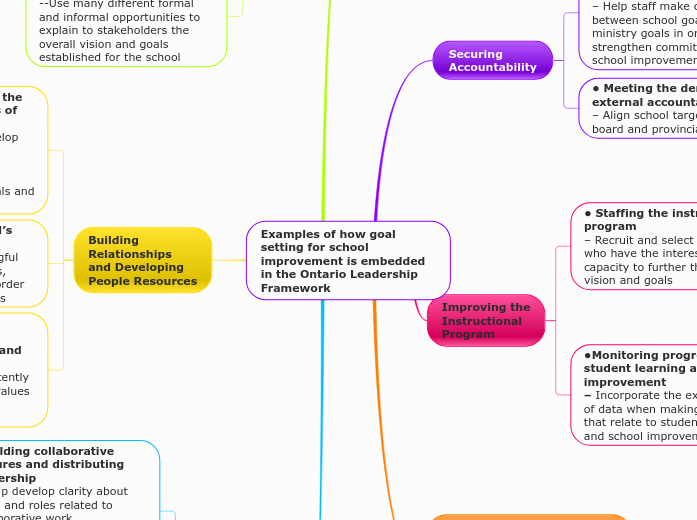Examples of how goal setting for school improvement is embedded in the Ontario Leadership Framework
Securing
Accountability
• Building staff members’ sense of internal accountability
– Help staff make connections between school goals and ministry goals in order to strengthen commitment to school improvement efforts
Share SIP during staff meetings
use student/parent data (e.g., surveys anecdotal notes) to help guide goals
• Meeting the demands for external accountability
– Align school targets with board and provincial targets
Share key ministry content to help drive learning goals
Improving the
Instructional
Program
• Staffing the instructional program
– Recruit and select teachers who have the interest and capacity to further the school’s vision and goals
Board HR will seek individuals who align with this goal
Principals can encourage teachers to take on volunteer tasks that align with staff personal interests and can help to improve student achievement
•Monitoring progress in student learning and school improvement
– Incorporate the explicit use of data when making decisions that relate to student learning and school improvement
Principals could review sources of data to help guide student learning and school improvement
Setting
Directions
Building a shared vision
– Help staff and diverse stakeholders understand the relationship between the school’s vision and board and provincial policy initiatives and priorities
Identifying specific, shared short-term goals
– Build consensus among students, staff and other stakeholders for the school’s goals and priorities
– Ensure the goals are clearly communicated to all stakeholders
Principals could share the vision virtually with staff students and parents.
Communicating the Vision and Goals– --Use many different formal and informal opportunities to explain to stakeholders the overall vision and goals established for the school
Building
Relationships
and Developing
People Resources
Stimulating growth in the professional capacities of staff
– Encourage staff to develop and review their own professional
growth goals and their relationship to school goals and priorities
Principals could encourage growth through Annual Learning plans
• Modelling the school’s values and practices
– Have frequent, meaningful interactions with teachers, students and parents in order to further the school goals
reiterate SIP at staff meetings, parent council meetings
• Building trusting relationships with and among staff, students and parents
– Act in ways that consistently reflect the school’s core values
and priorities in order to establish trust
Celebrate student achievement, making the effort to connect with students within the school and during recess yard duty
Developing the
Organization to
Support Desired
Practices
•Building collaborative cultures and distributing leadership
– Help develop clarity about goals and roles related to
collaborative work
– Involve staff in the design and implementation of important
school decisions and policies
Principals collaborate with stakeholders and Superintendent to help focus goals
Allocating resources in support of the school’s vision and goals
– Distribute resources in ways that are closely aligned with the
school’s improvement priorities
– Ensure that ensure that sustained funding is directed to the
school’s improvement priorities
Principal can advocate/collaborate with stakeholders for more funding to gather resources
